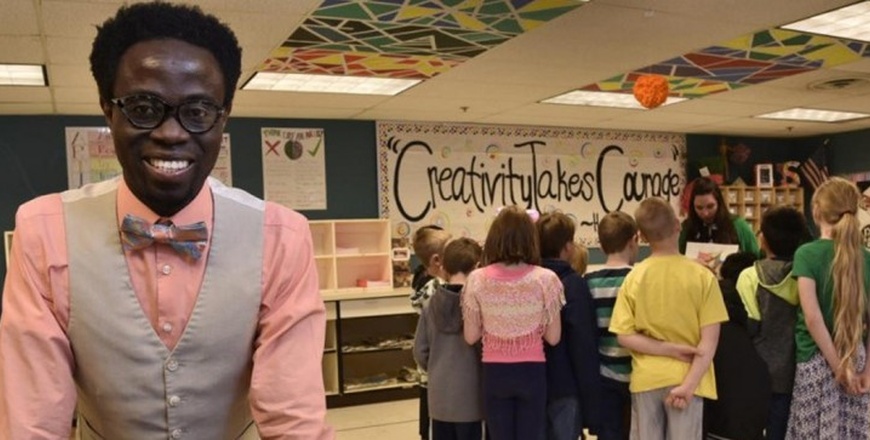Bertine Bahige from the DRC was just 13 years old when rebels took him to become a child soldier. After a long journey, he is now a school principal in the US.
Bahige was dreaming of becoming a doctor when he was forcibly taken by rebels from his family and thrown into the horrifying world of being a child soldier. After two years of captivity at the hands of Mai Mai rebels in eastern Democratic Republic of the Congo (DRC), Bahige escaped and ended up in a UN refugee agency (UNHCR) camp in faraway Mozambique.
Five years later, in 2004, he was one of the lucky ones to be resettled in Maryland, United States, where he landed a job taking out the trash at a fast-food restaurant. He progressively moved up the ladder to become a cashier. “I always challenged myself to the next thing,”Bahige says. “I had been given a chance to live a new life, to educate myself, and I wanted to get the best out of it.”
Juggling three jobs at a time, Bertine joined community college and would never miss a class. Since he did not have a car, he would ride nearly 10 kilometres on his bike to make it to evening classes. Eventually, his hard work landed him a university scholarship – all the way in the Rocky Mountains. Today, he is married, serves as a primary school principal in Wyoming, and a father of two.
Last year, in support of the Global Compact on Refugees, Bahige shared his fascinating story of how he went from a doctor in the DRC, to an elementary school principal in Wyoming with a wife and two children of his own.
“There is a misunderstanding on who refugees are and what they are asking for – all refugees are asking for is an opportunity,” he said. “Sometimes we look at it as, ‘How much is that going to cost me?’ But we fail to look at it from the other side – ‘What can refugees bring? How can they enrich our community?’”
Because of what he went through as a child, Bertine deeply enjoys working with at-risk kids and is able to connect with them at a deeper level than a regular teacher. “I understand where they come from, what it’s like not to have food, to think that it’s you against the whole world, to not understand English,” he says. “But I also understand that that’s an opportunity for me to show them that I got them, that we are going to work together step by step, that they can actually be successful.”
Distributed by APO Group on behalf of United Nations (UN)







Psygon Services on Cleantech businesses to watch in 2024
John Dou Dou on Being Your Own Boss - Part 2
Friends for upcoming artist ltd on Crypto Fest 2022 Hosted by Bitcoin Events
ignatious mukombwe on Being Your Own Boss - Part 3
Muhondo Organic Farming Center on Woman power: Top 5 female change-makers in West Africa
Muhondo Organic Farming Center on Woman power: Top 5 female change-makers in West Africa
Muhondo Organic Farming Center on African Development Bank: Boosting African farming doesn't require aid but investing in agripreneurs
Warren Adams on Secure funding for your start-up like a pro: five tips
AfriTech Hub on AfriTech Hub: Increasing the STEM Workforce
TOBAINO FOODS on What does it take to be a millennial entrepreneur?